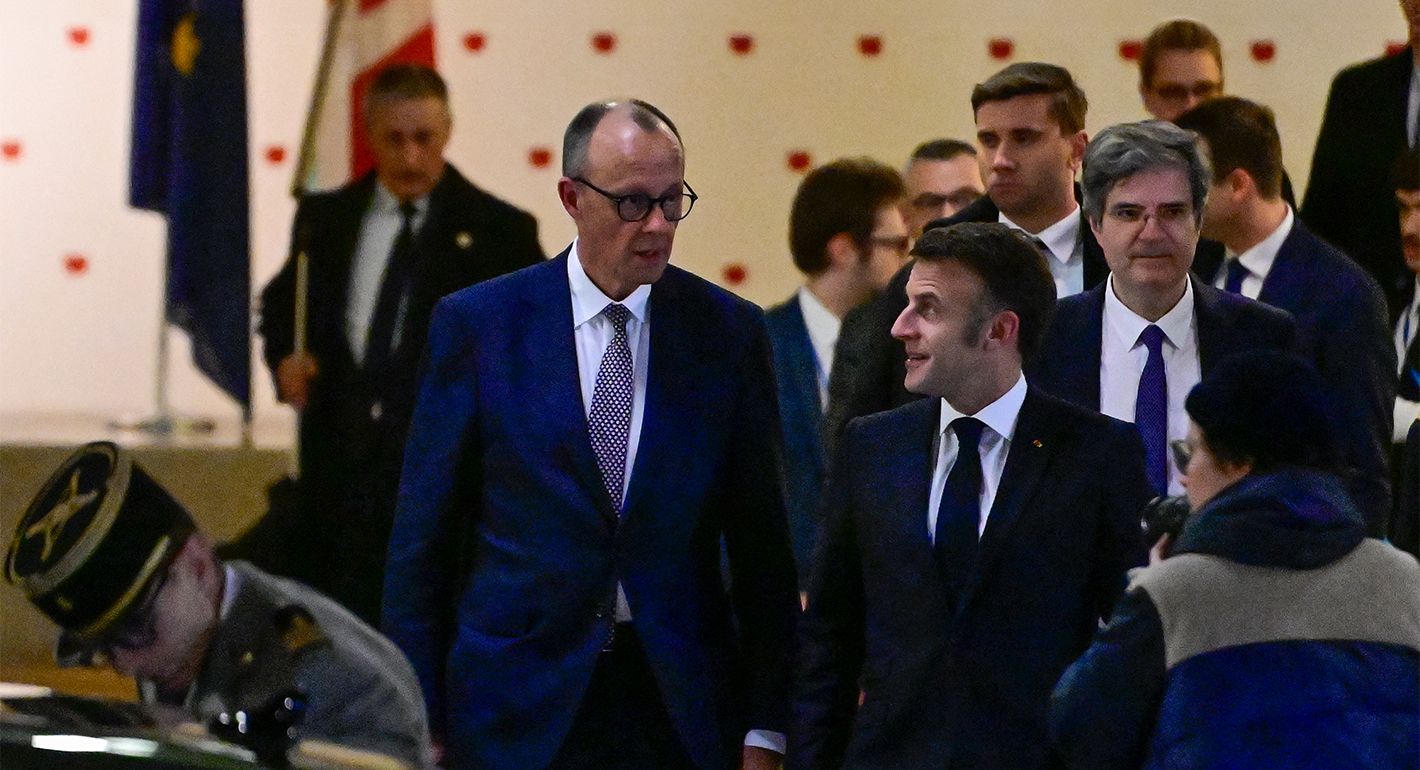The cliff edge that foreign and defense policymakers in France and Germany are standing on is dizzying.
The United States is increasingly engaged in a kind of isolationist expansionism. It is retreating from its decades-long role as the guarantor of an international order it has wildly benefited from. Instead, Washington is undermining the security of its closest allies by waging a trade war against them, threatening to withdraw its troops and annex some of their territory, while seeking a peace deal in Ukraine that does nothing to deter continued Russian aggression.
As the respective military and economic leaders of Europe, France and Germany are hence left holding the bag. They must preserve the security, stability, and prosperity of Europe, reinvent the transatlantic relationship to save it, while facing an expansionist Russia and China’s aggressive competition. This requires an epochal transformation from both Berlin and Paris, which is twofold: They must shepherd the military and financial capacities for Europeans to buoy Ukraine without the United States, while also overhauling their industrial, defense, and foreign policymaking.
It may seem that for former president Charles de Gaulle’s France, this is a dream come true. At last a moment when Europeans see the U.S. hegemon for what Paris always suspected it to be: unreliable, domineering, and adversarial. The reality is far from it.
No one in serious positions of responsibility in France is rejoicing at this fundamental undermining of the Western order or pretending that Paris could replace Washington. The more senior the officials, the more painfully aware they are of just how massive the challenge is.
France faces three major challenges.
First, in light of the increasingly unreliable U.S. security guarantee in Europe, Paris must convincingly explain its nuclear deterrence doctrine to its European allies, how it differs from the American one they’ve been used to, and why it is effective.
Second, France can no longer fake it till it makes it in terms of national finances. Its budget deficit is now hindering its power.
Third, its defense industrial base must become more flexible, adaptable, and effective both to produce bigger quantities faster and to successfully anchor the European consolidation now required.
Across the Rhine, the reckoning is harder because of the foundational role of the U.S. security guarantee in postwar Germany, though the incoming chancellor Friedrich Merz has sent resolute signals about his preparedness to step up.
He broke a historic taboo on the night of his party’s—the CDU’s—electoral victory by asserting that his “absolute priority will be to strengthen Europe as quickly as possible so that, step by step, we can really achieve independence from the USA.”
Nevertheless, Germany too faces three challenges.
First, the German establishment has to quickly invest in a new foreign and security nervous system without the United States, which it wasn’t built to do. Recent closed-door discussions with various officials—including some from the CDU—reveal how difficult the process is. Many recoil at explicitly recognizing that the United States no longer wishes to be the ultimate guarantor of European security. They either avoid tackling the issue head-on or continue to hold on to a fleeting hope that everything will go back to normal after U.S. President Donald Trump’s term. They warn of an imagined “self-fulfilling prophecy” European leaders, who are reckoning with the changing role of the United States, might be creating.
Second, Germany’s ailing economy is a geostrategic problem for Europe. It contracted two years in a row in 2023 and 2024 and is expected to have 0 percent growth in 2025. It needs to reinvent an economic model away from the three pillars that have powered it so far: U.S. security, Russian cheap energy, and Chinese export markets. That transformation is certainly one of the most challenging but also could carry a generational windfall if successful.
Third, once he takes office at the beginning of May, Merz will need to find the political courage to propel Germany into a more lethal role in the coalition of the willing in support of Ukraine, even without deploying troops.
The good news is that with his arrival, Franco-German coordination and cooperation is set to be revitalized after a dismal period under former chancellor Olaf Scholz.
None of the above precludes both countries from successfully leading the European effort to empower Ukraine. They are capable of helping it stem the adverse effects of the two current potential scenarios: a U.S.-brokered deal with Russia—that recognizes its annexation of Crimea and excludes Kyiv from NATO—or the United States walking away from the process altogether, having failed to reach a deal but having emboldened Russia in its aggression by sapping the Western camp.
That will be the first of two tests of their leadership which they cannot pull off without close and vital coordination with the UK, Nordic, Baltic, and Eastern states, in addition to Turkey.
The second test will be how to handle the question of whether and when the Europeans should reengage with Russia.
This was raised by a couple of countries, though not France, at a recent summit hosted by French President Emmanuel Macron around building a robust peace and security in Ukraine and Europe. The question was dismissed as untimely and not germane, but it has since come up in lower-level discussions and is one that Europeans must prepare for. It will be the critical second phase of how the continent navigates the end of Russia’s war against Ukraine, after Europeans ensure Kyiv’s survival and strength.
This will be the ultimate test of the overhaul of German and French foreign policy. They would repeat grave past errors if they do not invent a new diplomatic format that at the very least ensures systematic close coordination with Baltic, Nordic, and Polish allies upstream and downstream of any discussions with Russian counterparts.
Collective leadership and truly pooled capabilities are how Europe can assert its geopolitical power in the coming world without an order.




